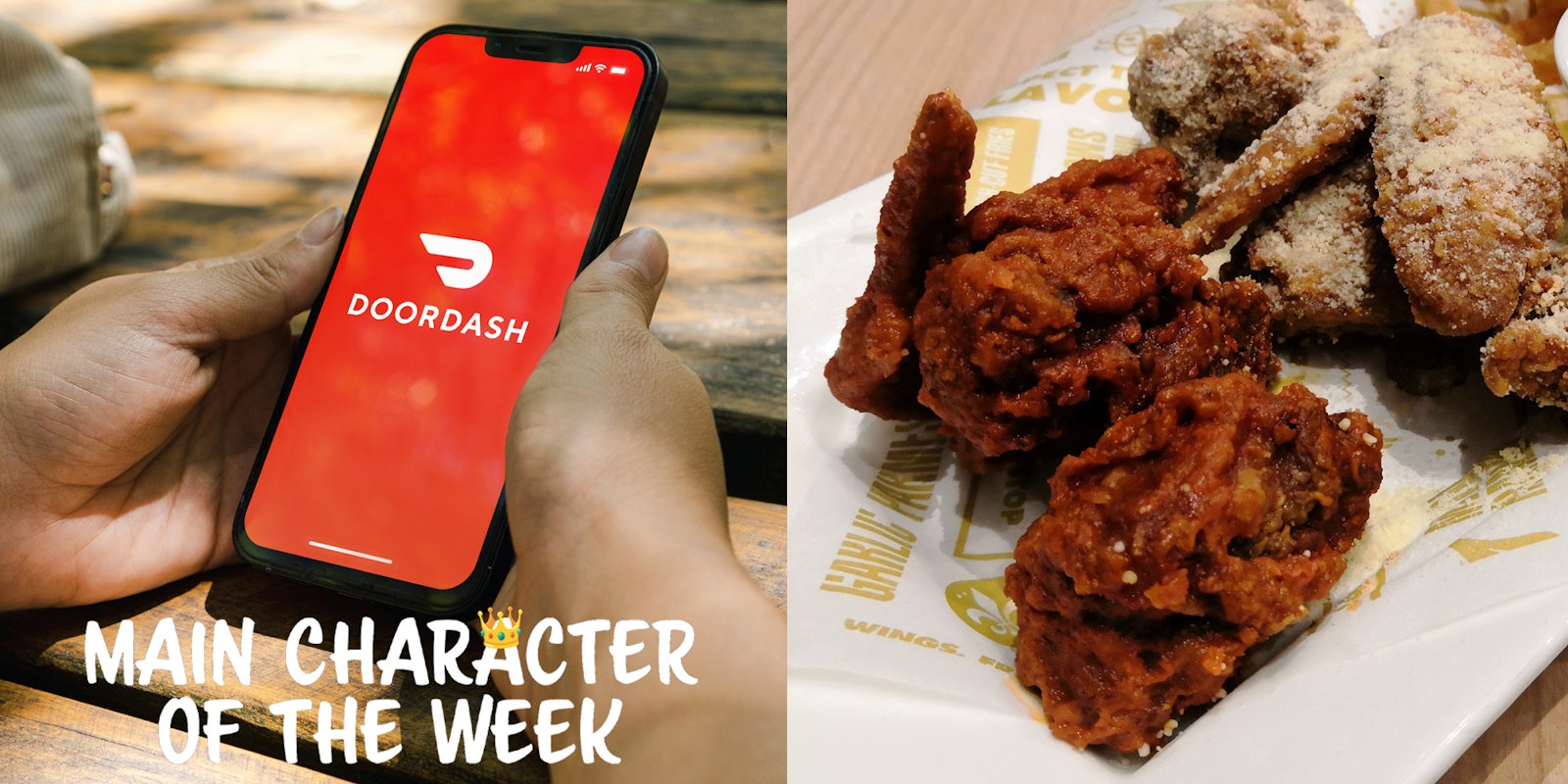Main Character of the Week is a weekly column that tells you the most prominent “main character” online (good or bad). It runs on Fridays in the Daily Dot’s web_crawlr newsletter. If you want to get this column a day before we publish it, subscribe to web_crawlr, where you’ll get the daily scoop of internet culture delivered straight to your inbox.
The internet is a stage, and someone unwillingly stumbles onto it weekly. This makes them the “main character” online. Sometimes their story is heartwarming, like doomed fools who ate at a revolving sushi restaurant before looking at its price point; usually it’s a gaffe. In any case, that main character energy flows through the news cycle and turbo-charges debate for several business days.
Here’s the Trending team’s main character of the week.
Let’s hear it for the DoorDash driver with “crackhead energy” who ate the Wingstop order before he delivered it.
It’s a pretty forgiving scenario. Food delivery services such as Uber Eats and DoorDash come with the understanding that you’re going to get about 80% of what you want, 90% of the time. And sometimes the order will be incomplete, late, abruptly canceled, or it won’t arrive at all. Yes, because maybe the driver got hungry.
So really this is a common occurrence that is totally expected: Woman orders Wingstop and gets just the bones. It’s a punchline. It’s remarkably audacious. Especially when this delivery driver pretended to George Costanza-levels and even went so far as to get on the phone to discuss his lack of wings delivered with the customer. His mistake was putting the manager on the phone.
“Obviously he ate your food,” the manager told her.
The story has a relatively happy ending. DoorDash issued a partial refund and the woman who went viral by posting about the story was wise enough not to be a Karen about the order, telling the Daily Dot that she was not about to become entitled over fast food because the driver seemed unhinged. This is a story about listening to your gut.
For a news story to go viral, in our experience, it needs to touch on one of three points. It is either a PSA, a new fear unlocked, or it’s relatable. The latter has become my favorite story because it does not require an ounce of sensationalism in its framing to resonate with readers.
Don’t get me wrong, as a news editor I believe that every headline should be as thirsty as possible and intended to land with as many people as possible. I believe that we earn our spicy headline with detailed reporting that makes it unimpeachable, but that it is paramount we chase the splashiest possible headline with nearly every assignment.
Every good headline in the history of journalism is clickbait.
Readers, myself included, dislike headlines and consider them clickbait when they are misleading; when we do not get what we signed up for as users by clicking.
The most common example I can think of is a photograph of a comet striking the planet and a headline by a tabloid about a comet approaching our planet. This gets me every time. And then I read about an asteroid that will merely graze our galaxy in 30 years and is of no immediate threat.
But a story that barters in clear-eyed language about a looming problem that you should know about? Call it clickbait and sign me up.
And so with relatable stories what I don’t get is anything other than plain facts that do not need to be concealed via what we in the business call a “curiosity gap”: As in, dog bites man and you won’t believe what the dog did for an encore.
Instead, I get the punchline in the headline and I still want to click to learn more. That is journalism nirvana: Direct, effective, and relatable.
“‘The fact he still delivered it’: Woman says DoorDasher ate her wings from Wingstop, delivered her the bones” helped us earn lots of reader attention… that traded for well-reported information.
I consider the reader to be the most important customer that the Daily Dot can ever hope to build a relationship with and if I give you nothing but misdirection in my headlines, you will not trust me, lose interest, and downvote my website out of your news feed.
My favorite bit of reader feedback we got recently was that our website always delivers relevant information but that because of its design, which is admittedly antiquated, it can sometimes look a little too much like clickbait.
We use that to our advantage. We lower reader expectations and then make them pleasantly surprised when they realize that there’s solid information here. So it’s become a great tagline for us: The Daily Dot, we only LOOK like clickbait.
Speaking of which, we are in the process of revamping our existing tagline, “The frontline of online,” so if you have any suggestions we sure would love to read them.
As always, thanks for visiting the website and I hope your next food delivery order comes with a full suite of lemon pepper wings and a driver resisting the urge to eat them.
The internet is chaotic—but we’ll break it down for you in one daily email. Sign up for the Daily Dot’s web_crawlr newsletter here to get the best (and worst) of the internet straight into your inbox.

